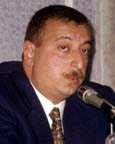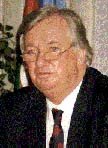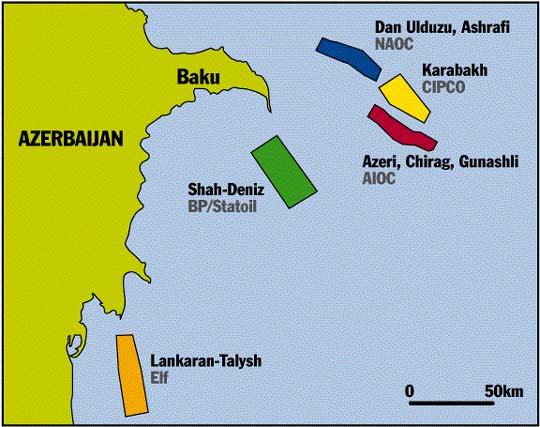|

Spring 1997 (5.1)
Pages 44-47


 |
 |
|
Ilham Aliyev,
Vice President of SOCAR. |
Terry Adams,
President of AIOC. |
The following press conference
took place on February 18, 1997, in Washington, D.C., at a conference
entitled "Azerbaijan from Communism to Democracy-Growth
with Oil" which was organized by the U.S.-Azerbaijan Chamber
of Commerce.
Oil is being transported
to Azerbaijan from the Tengiz field in Kazakhstan. Can you tell
us how this is developing?

Five Consortium Contracts in the Caspian Sea signed with Azerbaijan
as of July 1997. Name of field in dark print, operator or consortium
designated in gray print.
Map: Azerbaijan International. Copyright 1997.
Aliyev: We've recently signed a deal to transport oil
from the Tengiz field. Already, our tankers have received about
30,000 tons of oil. And if all goes well, the amount will increase
to 1.5 million tons annually.
This is a significant political
event for us because it makes Azerbaijan a third-party transit
country. In the future, I think other countries may look more
closely into the possibilities of transporting oil this way.
Has SOCAR had any discussions
with the government of Iran regarding oil swaps similar to those
which are taking place with Kazakhstan [meaning Kazakhstan's
share-not Chevron's -being swapped]?
Adams: Under the AIOC
production sharing contract, "early oil" produced from
Chirag-1 is treated collectively. We don't subdivide it. When
"later oil" is produced, then each shipment can be
treated as a separate batch.
Aliyev: So far, we haven't had
any discussions with Iran in regard to crude. We sell quite a
lot of oil products to Iran. But as far as transporting oil is
concerned, we have the northern pipeline [via Russia] which will
be operational very soon and the western pipeline [via Georgia]
which will be working in 1998. So we have sufficient transportation
facilities for the amount of oil which we actually produce. And
if you take into account that we are planning to build a main
export pipeline, all our demands will be satisfied.
It looks as though Azerbaijan's
stake and bonus have gradually risen with the five oil contracts
that have been signed in the past. Why is that? Are you all taking
tougher stands, or have you become more experienced?
Aliyev: It's true, we've
taken a tougher stand, and, of course, we've become more experienced.
But also, we have become more free and independent in deciding
whom to sign a deal with and when to do it. In 1994, it was quite
different than now. We've achieved considerable success since
then. We've managed to present ourselves as a reliable partner
country with whom companies can do fair business, which has led
to credibility and respect from the international community.
I should also mention that this
last contract with Elf and Total for Lankaran-Talysh was based
on a draft totally prepared by SOCAR. The companies accepted
it, and this was very positive for us.
What about the status of
the Caspian Sea? Is the fact that the status is not settled affecting
the willingness of consortium and oil companies to invest in
Azerbaijan?
Adams: I think you've
seen in the first two years of operation that a large number
of major companies have been prepared to commit and self-finance
their projects in the Caspian. Nearly $1.3 billion is being entirely
financed off the balance sheets of the companies who are participating.
We believe that the situation will resolve itself gradually and
that a sectoral division will be accepted. The majority of states
appear to support this arrangement already. We are even seeing
a consensus developing with Russia. We're optimistic that an
equitable solution between all the parties will emerge. Although
you may not necessarily achieve a final legal definition of the
problem, you can agree by consensus that investment can proceed,
and that's exactly what's starting to happen.
What about the proposal that
was recently made in regard to a pipeline through Ukraine?
Adams: The proposal
that Ukraine has set forth would take Caspian crude into the
North Sea market where it would be in severe competition with
comparable crude. So unless there is an overwhelming commercial
reason to use the Ukraine route, then it's very unlikely.
But we would like to hold discussions
with Ukraine in the immediate future. The route for the major
oil pipeline is not restricted to a single solution. In the end,
the route which offers the greatest commercial benefit to Azerbaijan
and the foreign investors will be chosen. The most attractive
market for Caspian crude seems to be the Mediterranean.
Has the decision been made
as to where the major pipeline will go?
Adams: We have an obligation
to submit a variety of pipeline options by mid-1997. All of these
must be commercially viable and technically feasible. Collectively,
the government of Azerbaijan, primarily, along with the commercial
investors will select a preferred route.
What about the option of
building a pipeline through Greece and Bulgaria?
Adams: That seems to
be a competitive alternative to Jeyhan [Turkish port on the Mediterranean].
We're very happy when we have a variety of options, so we can
negotiate the best commercial solution for the final selection.
What is the greatest challenge
to production?
Adams: Our greatest concern is that the Nagorno-Karabakh problem
should be resolved as soon as possible. The view of Azerbaijan's
President Aliyev is that 1997 should be the year of peace. The
resolution to the war must be achieved on an equitable basis
that recognizes the territorial integrity of Azerbaijan. When
Nagorno-Karabakh is resolved, a great deal of geopolitical pressure
will be diluted in that region.
Is AIOC receiving equipment
by road from Iran's Persian Gulf port of Banderabbas?
Adams: The predominate
route for the heavy equipment is through Georgia. I think we've
brought 160 miles of pipe tonnage through Georgia on the rail.
The heavy stuff is coming in from the Black Sea. Coming from
the Persian Gulf is specialized office equipment-routine supplies
that can be transported by conventional trucks. I've heard that
some 30,000 trucks per year are coming from Iran into Azerbaijan.
So it's a conventional route, and Dubai is a very conventional
supply center.
In a press conference last
year, you mentioned that LUKoil was a company just like any other.
Could you elaborate on what you meant? Does that mean there has
been some cooling of the relationship or some disappointment,
perhaps?
Aliyev: No, no, not
at all. When I said that LUKoil is a company like any other,
I meant it as a compliment because their aim is to become an
international oil company like BP, Amoco and the others. LUKoil
wants to become a regular reliable partner with all the attributes
of a large oil company. I think they're making great strides
in this direction. I can only congratulate them.
Adams: For the two years that
we've worked together, LUKoil has behaved impeccably just like
the other companies have. They take part actively in the management
of the company. They behave like a large Western oil company.
No different, whatsoever.
So far the discussion has
focused on offshore oil developments. What activities are happening
onshore right now?
Aliyev: Frankly speaking,
we're looking to invite large oil companies to come and operate
onshore because the potential is great enough to interest even
them. In the past, companies were competing with each other in
order "not to miss the train" with the projects offshore.
As far as offshore projects are concerned, we don't have any
problems attracting investment. On the contrary, we have more
potential clients than we are prepared to deal with.
But now we've started talking
about onshore. It's very important, and I think any company which
comes to work onshore will have a good chance later on of getting
involved offshore. We're optimistic that a contract will be signed
this year. We have several proposals from big oil companies.
It's too early to mention who they are. After one major company
comes onshore, you'll see that the others will be eager to do
the same thing.
There are plans for NATO
to hold a seminar in Baku concerning the security of the pipelines.
How ready are you for this seminar?
Aliyev: We are ready
to have any seminar in Baku (laughter). We appreciate when organizations
want to contribute their efforts to providing security related
to transportation. But, as far as the security of the pipeline
is concerned, AIOC is quite experienced in this issue. AIOC is
the operator of the pipelines, and I don't think they will need
any significant assistance from anyone. But if someone wants
to come and to cooperate with us and to help us in providing
security, we will be more than happy.
From Azerbaijan International (5.1) Spring 1997.
© Azerbaijan International 1997. All rights reserved.
Back to Index
AI 5.1 (Spring 1997)
AI Home |
Magazine
Choice
| Topics
| Store
| Contact
us
|





